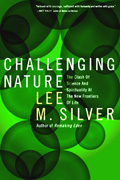 |
 |

|
How can you tell if a person's opposition to abortion and embryo research is informed
by religion and other pre-Darwinian ideas, even if the person claims otherwise?
Here’s a simple acid test.
Francis Fukuyama, like many other neoconservatives, claims that
religion has nothing to do with his opposition to embryo cloning and other human-affecting biotechnologies.
In Challenging Nature, I wrote that
Fukuyama's views were driven by a "traditional Christian conceptualization of a human soul." But
the science journalist Brian Alexander (who has taken Christian
fundamentalists to task in his other writings)
says
in a book review that "God references are just handy devices in
what amounts to a hard-boiled political fight." In particular, he claims that Fukuyama is careful "not
to appeal to religion," and I should take him and others (who deny religious influences) at their
word. In fact, Alexander is playing right into their hands as I learned from an acid test for Judeo-Christian
proclivities that I ministered personally to Fukuyama.
|
An acid test for religious proclivities -- which may exist covertly or subconsciously
-- needs to avoid direct engagement with issues of religious contention like evolution and embryonic
development. The test should instead be a thought-experiment about fully mature potential-human
beings that scientists could actually bring to life based on current knowledge and technology.
Here it is:
Imagine that human and chimp cells isolated from early embryos are brought together
to create a mixed-species chimeric embryo. If the embryo is allowed to develop to term, a healthy
partial-chimp/partial-human child could be born with any proportion of chimp and human cells
(from 1% to 99%) in each tissue and organ. The question I posed to Francis Fukuyama is whether
he thought every one of these individuals could be definitively classified either as a human
being or as a non-human being; the alternative idea is that no sharp line exists anywhere along
a continuum from chimp to human (and, by inference, between embryo and child), even though the
extremes clearly fall into two different categories.
Fukuyama's response was that each adult chimera had to be a human being or a
non-human being because there was no such thing as a partial human adult. This answer reveals
the Judeo-Christian intuition (conscious or subconscious) at the core of a person's belief system;
it is fundamentally in opposition to post-Darwinian scientific understanding. But it's not just
themselves that some neocons are fooling; it's independent supporters of biomedical research,
like Brian Alexander, who think it's mostly just politics.
